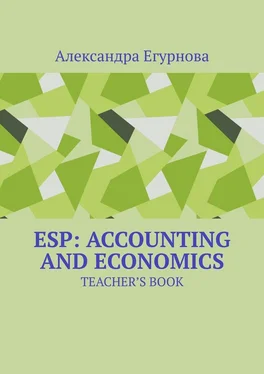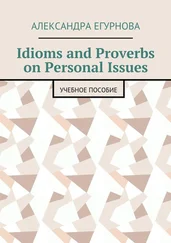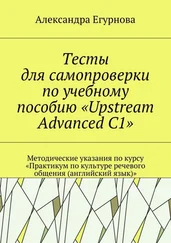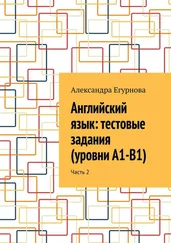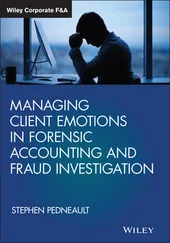ESP: Accounting and Economics
TEACHER’S BOOK
Александра Егурнова
© Александра Егурнова, 2021
ISBN 978-5-0055-1782-1
Created with Ridero smart publishing system
Task 2. Fill in the table with words from the text below. Mind the rules of reading.
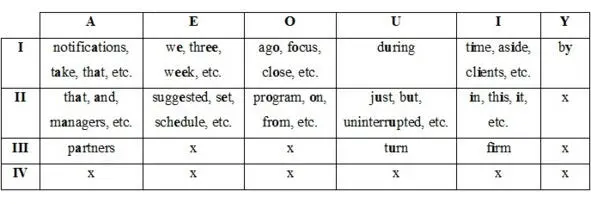
A few years ago, our firmput in a program thatwas suggested by Arianna Campbell of Boomer Consulting, andour people, especially our managers, really latched onto this, and wecalled it focus time. This is justa time that is set aside. We did threedays a week, anywhere from anhour anda half to two hours. The rules are pretty simple. You’re allowed to turnoffyour notifications, closeyour door, put onyour headphones, whatever you needto focus, butyou didn’thave to take phonecalls from clients. You don’t have to scheduleany meetings during that time. You don’t have to take phonecalls from partners, fromother employees. You’re freeto work onwhatever you need attention on at that time thatyou need uninterrupted activity. Cal Newport in hisbook Deep Work talks a lotabout the power andthe benefits andthe fact thatmost of us in the knowledge profession need this uninterrupted time. Distractions can, even if wedon’t realize them, can takea lotaway fromour focus and attention. The studiesshow it can take upto 20 minutes to get back into that concentrated effort. Soyou can imaginehow slowly you would work ifyou hadto deal with those interruptions ona regular basis.
Task 3. Practice good reading of the following limericks. Learn one of them by heart. Which occupations are mentioned in them? Which limerick is about your future profession?
Professions : teacher, miser (is not a profession), baseball player, rocket explorer.
Limerick about students’ future profession : none.
Task 8. Take a look at the occupations given below. Decide which of these people: a) work in an office; b) do manual work; c) are self-employed. Some professions fall into several categories.
Work in an office:
A civil servant, a tutor, a CPA, a scientist, a lawyer, a PA, a professor.
Do manual work:
A carpenter, a newsagent, a florist, a stationer, a shop assistant, a plumber, a nurse.
Are self-employed:
A carpenter, a tutor, a CPA, a newsagent, a florist, a scientist, a stationer, a plumber, a lawyer, a cyclist.
Task 9. Explain the terms below and use them to complete the sentences.
1. Sorry, but the vacancyfor a sales manager in the office has been filled.
2. Mike is very ambitious and interested in a job with good prospects for promotion.
3. Lucy studies at college during the day; that’s why she is in a part-time job.
4. Looking after a baby is a full-timeoccupation.
5. If you work extra hours, you will receive a handsome salary.
6. Not to go bankrupt, one third of the workforceis being made redundant.
7. Many workers were made redundantas a result of falling demand for the company’s products.
8. A performance-related pay gives our employees an incentiveto work harder.
9. Energy efficiencyand renewable power sources are the most essential topics addressed today.
10. Obviously, a pleasant and stress-free working environment increases productivityof the staff.
11. Jack’s been in a bad mood lately because of his temporaryunemployment, perhaps.
12. Don’t even think to quit your permanentjob or you’ll lose the stability you’ve been enjoying for so long!
Task 10. Work in pairs. Find the odd-one-out and explain why it doesn’t belong in the group. Use your dictionaries if necessary.
1. bonus – benefits – perks – fine
2. accountant – shrink – bookkeeper – CPA
3. interest – profit – penalty – benefit
4. revenue – loss – payment – bills
5. purchase – sale – asset – investment
6. idleness – business – career – position
7. salary – wage – capital – debt
8. experience – ignorance – practice – skill
9. professional – qualified – green – competent
10. manager – client – consumer – buyer
1) «Fine» is the odd-one-out because all other three mean something givenor paid over and above what is due, whereas «fine» is a sum of money takenas a penalty.
2) «Shrink» is the odd-one-out because all other three are professionals who have completed their studies at some educational institutions and have required certificates.
3) «Penalty» is the odd-one-out because all other three mean «gaining something’ while «penalty’ stands for «losing».
4) «Revenue» is the odd-one-out because all other three mean «losing something’ while «revenue» stands for «gain».
5) «Sale» is the odd-one-out because it means «to sell something» while the rest infer «acquiring, buying something».
6) «Idleness» is the odd-one-out because it means «doing nothing, not working».
7) «Debt» is the odd-one-out because «debt» is an obligation to pay something while the other three mean that you are given some payment.
Читать дальше
